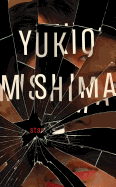
In Yukio Mishima's unsettling novella Star, Rikio Mizuno is a 23-year-old sex symbol in high demand, starring in back-to-back films. On location for his newest movie, his fans can hardly contain themselves just beyond the roped-off set. It's not a particularly innovative screenplay, though--crime, lust and betrayal in the life of a young yakuza. "There are too many movies like this to count.... But there's something timeless about the mediocrity of the story, no matter how many times I find myself inside of it." Musing as much on the sentimental arc of gangster films as that of celebrity artifice, Mishima draws readers' attention to "a hidden poetry that evaporates if but one strip of mediocrity is shed." He seems more interested in proving the genres' resilience than breaking new ground within them.
Rikio is discontent with his fame, but woe to anyone who might take pity on him for it; his response will be to play up his complacent naivete. His assistant Kayo is the only person he allows to see his faulty interior. She is his perfect foil: aging, homely and ignored by everyone. Cruel and impish, Kayo relishes the disdain of the world: "She boasted of her flaws as if they were an asset." And her greatest asset of all is the secret sexual relationships she and Rikio are carrying out.
Star is a sleek dalliance with the pitfalls of celebrity, and the translation captures a kinesthetic sense of prose, such as "a long, hyperactive nose" and a floor that "twinkled wet from everyone's umbrellas." It is a familiar story whose execution is hardly mediocre. --Dave Wheeler, associate editor, Shelf Awareness

